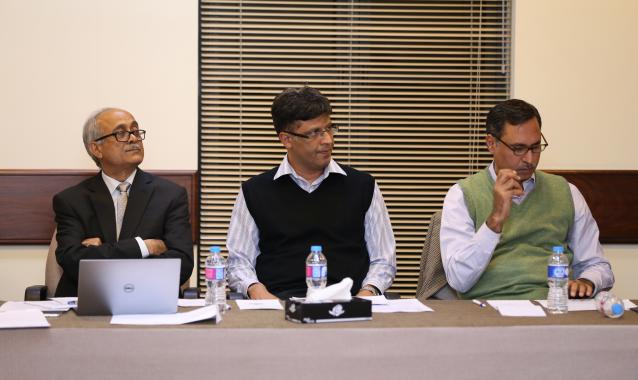
The Centre for Governance and Public Management (CGPM), LUMS organised a seminar on Friday, January 20, 2017, to provide structured feedback and suggestions on the draft of the Punjab Agriculture Policy prepared by the Punjab Agriculture Commission. Dr. Iqrar Ahmad Khan, VC Agriculture University Faisalabad outlined the broad contours of the policy, after which the participants discussed in detail the challenges faced by the agriculture sector in Punjab and the proposed policy responses. Dr. Ahsan Rana, Director CGPM moderated the seminar.
Participants at the seminar included Pro Chancellor LUMS, Syed Babar Ali, Vice Chancellor LUMS Prof. Dr. S. Sohail H. Naqvi, several LUMS faculty members, alumni of SDSB’s Executive Certificate in Agribusiness Management (ECAM) and a few agribusiness leaders.
Dr. Khan shared the policy proposals on nine broad issues related to Punjab’s agriculture sector. These issues included productivity increase, adapting to climate change, poverty alleviation, input subsidies, agriculture research and extension, improving seed provision, agriculture produce markets, genetically modified crops, and meeting globalisation challenges. These policy proposals emphasised increased use of technology, the need to improve farming practices, increasing investment in agricultural R&D, and developing a more robust legal and institutional infrastructure.
Commenting on the draft Punjab Agriculture Policy, Syed Babar Ali identified the exponentially growing population as a key challenge affecting agricultural productivity, modernisation, and government efforts to alleviate poverty. He also identified the very large, unproductive animal population and lack of access to the credit markets as key constraints for farmers. Other discussants added their input related to the role of the government and private enterprises, the need for strategic prioritising, ensuring that agriculture gets the importance of a primary industry in Pakistan, and creating adequate price incentives for small farmers.
Dr. Jawad Syed, Dean of Suleman Dawood School of Business (SDSB), gave his concluding remarks. He said that new technology, improved genetics, access to markets (virtual and physical), and strengthened credit markets are central to improving agricultural productivity. Further, he said that the debate on poverty, urbanisation, women empowerment and malnutrition all relate directly to people. He also spoke about external factors, such as political economy, governance, climate change, globalisation and international competition. “Research advocacy and stakeholder activism is strongly connected; therefore, there is a need to promote and encourage stakeholder activism,” concluded Dr. Syed.










